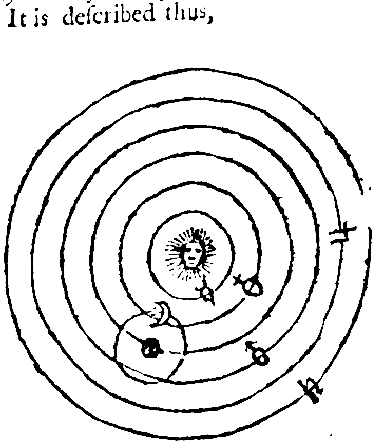Copeˊrnican System
Copeˊrnican System [so called of Nicholas Copernicus the inventor or rather reviver of it]is a system of the world, wherein the sun is supposed at rest, and the planets with
the earth to describe ellipses around him.
The heavens and stars are here supposed at rest; and that diurnal motion they seem
to us to have from east to west is reputed to be the earth’s motion from west to east.
It is described thus,


The sun being found to be a body more than 300 times bigger than our earth, it seemed
preposterous that so mighty a body of fire, should whirl round so large a circle as
his sphere, according to the Ptolomaic system, in so short a time as 24 hours (when according to its computed distance,
he must move 7570 miles in a minute.)
It was therefore more reasonable to believe, that the earth was seated in the sphere,
that Ptolomy had placed the sun in, and that the sun was placed in the center; for by that means,
if the earth but turn round upon its own axis in 24 hours, every side of it is turned
to the sun, and consequently a day and a night afforded to all its inhabitants, without
the necessity of the dun’s or earth’s making so vast a journey as the circle of its
sphere requires.
He therefore placed the sun in the centre, with no other motion than turning round
upon its own axis, which it performs in 27 days and a half.
He also supposes the sun to be surrounded with a vast space of Æther of many millions of miles extent, which is called its vortex, which Æther is carried round with the sun; ane because the planets float in it, they also are
carried in a continual circuit from west to east round the sun in certain periodical times, according to their nearness or distance
from the sun.
The earth is one of these planets, and has another attending her, viz. the moon; for that planet belongs to us only, being ina continual circuit round this
earth, and with it carried on in the annual circuit that the earth makes round the
sun.
The use of it being to reflect the sun-beams to us, at such times as he is gone from
us.
The other planets have the like concomitants.
Jupiter has four, and Saturn five, as is supposed for the same reason; and because those planets are so much farthr
distant from the sun than we are, they have of consequence occasion for moons than
we have.
It is certain by ocular demonstration, that there are four little planets call’d Satellites, which are in continual motion round about Jupiter, that are so regular in their motions, that the eclipses of them are calculated,
and thereby a great help found out to the correcting of the maps.
See the above scheme.
Definition taken from The Universal Etymological English Dictionary, edited by Nathan Bailey (1736)
Recusant Convict * Coˊrtical Part of the Brain [with Anatomists]